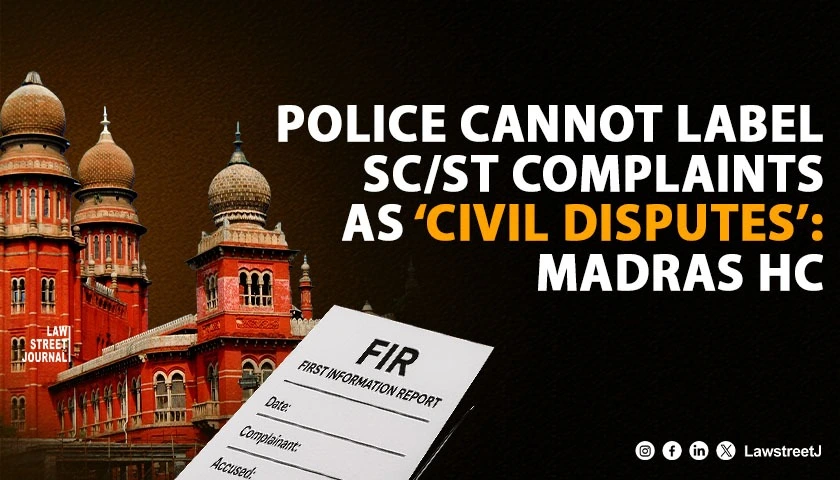Chennai: The Madras High Court has ruled that police officers cannot conduct preliminary enquiries or classify complaints as “civil disputes” when allegations disclose offences under the SC/ST Act, emphasizing that Section 18-A mandates immediate FIR registration without prior investigation.
Justice L. Victoria Gowri examined whether police discretion to determine the nature of a dispute can override the statutory mandate of immediate FIR registration in cases involving alleged dispossession of Scheduled Caste members from ancestral lands.
The Court heard Criminal Revision Case No. 479 of 2022 filed by a Sub-Inspector and Deputy Superintendent of Police challenging an order dated 10.02.2022 by the Special Judge (PCR), Tiruchirappalli, directing FIR registration against them under Section 156(3) CrPC for alleged neglect of duty under Section 4 of the SC/ST Act.
The de facto complainant, a Scheduled Caste member (Hindu Paraiyan), alleged that lands assigned to his ancestor in 1927—Survey Numbers 797/6 (60 cents) and 797/7 (22 cents)—were illegally occupied by upper-caste persons. A civil suit was pending regarding the same lands. The complainant filed a complaint on 30.11.2021, leading to CSR No. 457/2021.
Rather than registering an FIR, the police officers issued summons and conducted an enquiry, ultimately declining FIR registration on the premise that the dispute was civil in nature. The Special Court found this approach legally impermissible under Section 18-A of the SC/ST Act and directed FIR registration, specifying that investigation be conducted by a competent officer other than the DSP who had pre-judged the matter as civil.
The petitioners challenged this on multiple grounds: mechanical exercise of Section 156(3) power without application of mind; non-compliance with Supreme Court guidelines in Priyanka Srivastava v. State of UP requiring an affidavit and prior resort to Sections 154(1) and 154(3) CrPC; absence of a prima facie case as the matter was purely civil; requirement of prior sanction under Section 197 CrPC before directing an FIR against public servants; and the contention that Section 4(2) of the SC/ST Act requires departmental enquiry/recommendation as a pre-condition before proceeding against public servants.
The petitioners argued that since a civil suit was pending on the same property, and the complainant failed to appear despite summons issued on three dates, the matter was rightly closed as civil. They contended that Crime No. 287/2021 had already been registered against private parties, and targeting officers for “not registering FIR” was mala fide.
The Government Advocate countered that the complaint squarely alleged dispossession of a Scheduled Caste member from ancestral assignment (Panchami) lands. Once such averments disclose cognizable offences under the SC/ST Act, Section 18-A mandates FIR registration without preliminary enquiry. The officers’ conduct of issuing summons and closing the complaint as “civil” circumvented the statutory mandate, amounting to neglect of duty under Section 4.
Justice Victoria Gowri analyzed the statutory framework comprehensively. On application of mind, the Court held: “The impugned order discusses (i) the assignment nature of the property, (ii) the complainant’s caste status, (iii) the police issuing summons without registering FIR in an SC/ST complaint, (iv) the embargo under Section 18-A, and (v) the competence/role under Rule 7. The reasoning shows that the Court addressed the statutory contour and the admitted conduct of the officers. The order is not a perfunctory one-liner.”
On the crucial issue of Section 18-A, the Court stated: “Post-amendment, Section 18-A expressly provides that no preliminary enquiry shall be required for registration of an FIR when information discloses an offence under the SC/ST Act. The complaint alleges wrongful occupation/dispossession of assignment lands belonging to an SC family—allegations that, on their face, attract Sections 3(1)(f), 3(1)(g), and potentially 3(1)(p).”
The Court emphasized: “In such a statutory setting, the officers could not supplant registration by a roving ‘civil-dispute’ enquiry. Whether the land is indeed ‘Panchami/assignment land,’ whether an alienation is void, and what reliefs follow are matters for investigation and, where necessary, civil adjudication. They do not dilute the duty to register an FIR once the complaint ex facie discloses cognizable offences under the SC/ST Act.”
Addressing the civil-suit pendency, Justice Gowri held: “The pendency of O.S. No. 253/2021 neither immunizes conduct constituting offences under the SC/ST Act nor authorizes the police to decline FIR. Criminal law and civil remedies can co-exist if the factual matrix supports both. The civil veneer of a title/injunction suit cannot be employed to deflect the statutory command in a special penal law enacted to protect members of Scheduled Castes from dispossession and socio-economic exclusion.”
On sanction requirements, the Court ruled: “Sanction protects bona fide official acts at the stage of cognizance. A direction to register an FIR and investigate does not amount to taking cognizance of the offence against the public servant. Moreover, neglect of statutory duty under a special protective statute is not an integral act in discharge of official duty so as to cloak the alleged inaction with Section 197 CrPC immunity at the pre-investigation stage.”
Regarding departmental recommendation, the Court stated: “Section 4 criminalizes wilful neglect of duties by public servants under the SC/ST Act. The statute does not prescribe an administrative/departmental recommendation as a pre-condition for registration of an FIR or investigation. Departmental measures may proceed in parallel, since they are not jurisdictional fetters upon criminal law.”
The Court found Priyanka Srivastava guidelines satisfied: “The record shows (i) a prior police approach and CSR No. 457/2021 (satisfying Section 154(1)), (ii) failure to register FIR in an SC/ST complaint, and (iii) recourse to the Court with materials. The learned Special Judge considered the averments and citations and recorded reasons.”
Justice Gowri concluded: “The complaint discloses cognizable offences under the SC/ST Act relating to alleged dispossession/encroachment of assignment lands. Section 18-A barred the very course adopted by the petitioners—namely, the pre-registration enquiry and closure as civil.”
The Court affirmed the Special Court’s order and directed that if FIR is not yet registered, it shall be registered forthwith and investigation completed within eight weeks by a competent officer other than the DSP who had pre-judged the matter. The Court clarified that it expressed no opinion on ultimate merits regarding title/possession in the civil suit.
In the epilogue, Justice Gowri observed: “The SC/ST Act is a remedial statute with a prophylactic design. When a complaint from a member of a Scheduled Caste alleges dispossession from ancestral assignment lands, the law does not permit public authorities to filter the grievance through a civil-dispute prism at the threshold. The mandate is to register, investigate, and then decide—not to screen out by an informal enquiry.”
Mr. C. Muthu Saravanan appeared for the second petitioner, Mr. B. Sekar for the first respondent, and Mr. S.S. Manoj, Government Advocate, for the second respondent.
Case Title: Suriya and Another vs. Gandhi and Another




![TN Medical Council declares change of gender identity of LGBTQIA+ as misconduct [Read Notification]](/secure/uploads/2022/12/lj_5268_5cebb05a-97fb-40fb-8045-25cdf8f4207a.jpg)
![Madras High Court Directs Tamil Nadu Government to Ensure Quota for Transgenders in Local Body Elections [Read Order]](/secure/uploads/2023/08/lj_2507_7a03d113-08b1-4670-b6fb-9058aee481d0.jpg)
![Anti Corruption sleuths acted like "puppets in The Muppet Show", HC notice to ex TN CM in disproportionate assets case [Read Order]](/secure/uploads/2023/09/lj_8675_7b37fc02-1b2d-4f4a-9816-3df20545b37e.jpg)






